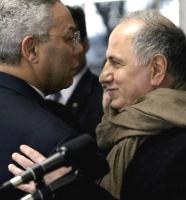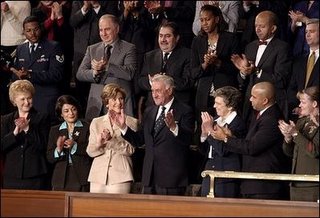Heroes In Error
 MotherJones
MotherJones How a fake general, a pliant media, and a master manipulator helped lead the United States into war.
Jack Fairweather
March/April 2006 Issue
EIGHT WEEKS after September 11, a pair of Americans entered the gleaming marble lobby of Beirut’s Intercontinental Hotel La Vendome, where they were greeted by a group of Iraqi expatriates. The Americans were reporters—New York Times war correspondent Chris Hedges, who’d just been put on the Al Qaeda beat, and Christopher Buchanan, an associate producer of PBS’s Frontline—there to meet a mysterious Iraqi defector with information about Saddam Hussein’s secret weapons program. Hedges and Buchanan were ushered to an elegant suite overlooking the Mediterranean, where they interviewed Jamal al-Ghurairy, an Iraqi lieutenant general who had fled Iraq. Ghurairy claimed to have witnessed foreign Islamic militants training to hijack airplanes at an Iraqi terrorist training camp.
Buchanan had been given the assignment just a few days earlier and knew very little about the interview’s subject. “It was all very hush-hush,” he says. “His life might be in danger. I didn’t know much else.” Buchanan recalls the general as thickset, “fierce looking,” and having a military bearing. “He looked the part,” he says. Hedges adds that the general “was definitely Iraqi and struck me as having spent a lot of time in the military.” The general’s entourage—including Nabeel Musawi, the political liaison of the Iraqi National Congress (INC), which had arranged the interview—“were all wearing leather coats. They were slick and well organized,” says Buchanan. “Very well organized, very well set up,” Hedges concurs.
The general hadn’t been told he’d be filmed, and it took Musawi almost an hour to persuade him to go on camera. The general himself then spent several minutes making sure his face would be blacked out when the tape rolled. The resulting television interview, for which Musawi acted as translator, was stilted and brief. It would become only a small segment of the Frontline piece, which also featured an intervi
 ew with another INC-provided defector, Sabah Khodada, a former Iraqi captain whose identity was not concealed. Buchanan recalls that “as soon as the lights and camera were switched off, the general began to talk.” He says the general then spent more than an hour with Hedges in an adjoining room of the suite while he left the hotel to transmit the tape via satellite uplink. When Buchanan eventually returned to the empty suite, he found coffee cups and saucers filled with cigarette butts that he felt indicated an intense conversation. Hedges says that after the interview was completed, he “spoke to the U.S. embassy in Turkey”—where the general had fled after leaving Iraq—“and asked if the general was credible. They confirmed he had recently been debriefed.”
ew with another INC-provided defector, Sabah Khodada, a former Iraqi captain whose identity was not concealed. Buchanan recalls that “as soon as the lights and camera were switched off, the general began to talk.” He says the general then spent more than an hour with Hedges in an adjoining room of the suite while he left the hotel to transmit the tape via satellite uplink. When Buchanan eventually returned to the empty suite, he found coffee cups and saucers filled with cigarette butts that he felt indicated an intense conversation. Hedges says that after the interview was completed, he “spoke to the U.S. embassy in Turkey”—where the general had fled after leaving Iraq—“and asked if the general was credible. They confirmed he had recently been debriefed.”Two days later the story that spun out on the front page of the New York Times was as shocking as it was convincing. Ghurairy claimed that as a senior intelligence official, he had witnessed foreign Arab fighters training to hijack airplanes at the Salman Pak military facility south of Baghdad. About 40 foreign nationals, Ghurairy said, were based there at any given time. “We were training these people to attack installations important to the United States. The Gulf War never ended for Saddam Hussein. He is at war with the United States,” the Times quoted Ghurairy as saying. Ghurairy also claimed a German scientist was working in a section of the base that produced biological agents. The report noted the role the INC had in setting up the interview, but no serious questions were raised about the general’s provenance.
The impact of the article and the concurrent Frontline show, “Gunning for Saddam,” was immediate: Op-eds ran in major papers, and the story was taken to a wider audience through cable-TV talk shows. When Condoleezza Rice, then George W. Bush’s national security adviser, was asked about the story at a press briefing, she said, “I think it surprises no one that Saddam Hussein is engaged in all kinds of activities that are destabilizing.” Vanity Fair and the London Observer elaborated on Ghurairy’s claims; another version of the story appeared in the Washington Post courtesy of defector Khodada. The White House included the story of Salman Pak in its “Decade of Deception and Defiance” background paper prepared for President Bush’s September 12, 2002, speech to the United Nations General Assembly. Along with the tale of Mohammed Atta meeting Iraqi intelligence agents in Prague—another INC-hyped story—Ghurairy’s account helped establish the connection between Saddam and the 9/11 hijackers, making Iraq, like Afghanistan, a legitimate target for Bush’s war on terror.
Unfortunately, the story was an elaborate scam. The purported general had indeed met with American intelligence agents in Turkey, but unbeknownst to Hedges the agents had dismissed his claims out of hand. What the reporters also didn’t know, and what has never before been reported, is that it now appears that the man himself was a fake. According to an ex-INC official, the Ghurairy who met with the Times and PBS was actually a former Iraqi sergeant, then living in Turkey and known by the code name Abu Zainab. The real Lt. General Ghurairy, it seems, had never left Iraq.
More:http://www.motherjones.com/news/feature/2006/03/heroes_in_error.html

0 Comments:
Post a Comment
<< Home